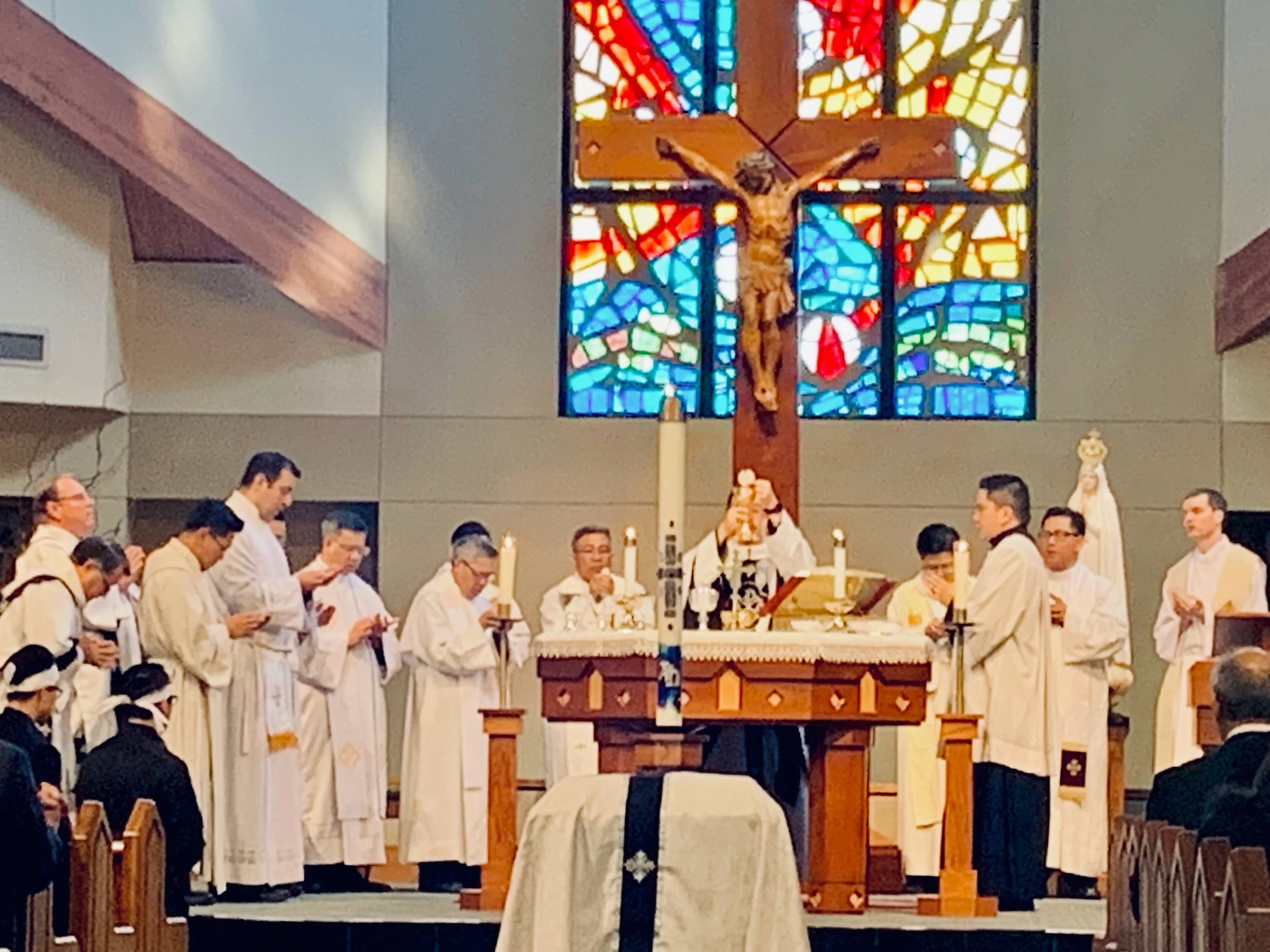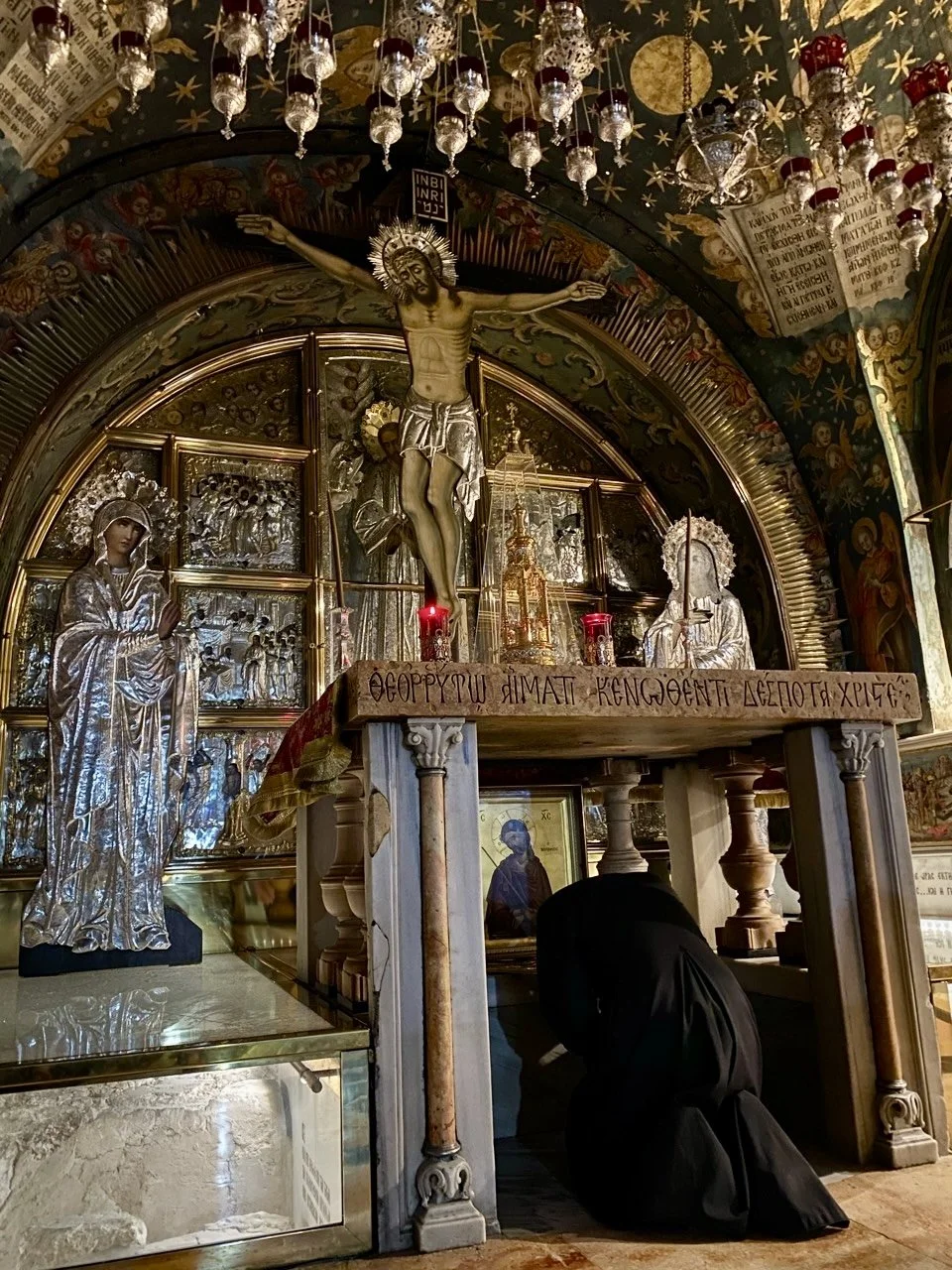Perturbed and Deeply Troubled
When I got news that my mother’s cancer was getting worse and would probably not get any better through treatments, I was actually on Retreat at a Monastery in California. As soon as I heard, I changed my flight home and the very next day I got on a plane and flew back to Houston to see my mom. She did not die until a few weeks later, but even in looking back, I would have still left my retreat and gone home to be with my mother. For most of us this is the normal and loving response to sickness and death. And because this is so intuitive to us, we are forced to ask the question: “Why is Jesus’ response so different from my own?”
In the Gospel, Mary and Martha send word to Jesus that their brother, “the one you love is ill” they say. And when Jesus heard this he said, “This illness is not to end in death, but is for the glory of God…”
Then the Gospel notes: “Jesus loved Martha and her sister and Lazarus. So when he heard that he was ill, he remained two days in the place where he was.”
This bothers me. Does it bother you? I think it’s supposed to bother us. I think this is the point of this Gospel. St. John tells us that Jesus loved Lazarus, and yet he purposely delays his visit to the one he loves.
Doesn’t love rush to their beloved. Doesn’t love want to be with their loved ones?
Last week, we talked about the Man Born Blind and not asking the wrong question but learning to ask the right question. Don’t ask “Who’s fault is it?” for this suffering, ask “God, what will you do with this?”
But the reality of suffering and healing is that often God doesn’t always show us what he will do with a snap of a finger. Although he can certainly do so and sometimes does. Our healing and freedom normally doesn’t happen all at once. Like Mary and Martha, we send word to Jesus that we are suffering, that there is something we need his help with, that we want to be healed of the wounds that we carry in us and then we wait.
And wait.
And wait…
What’s taking you so long, Jesus? I’m right here, I’m calling on you! Where are you?!
And so it bothers us to hear today that Jesus purposely delays his coming. St. John reminds us that Jesus loved Mary, Martha and Lazarus. It is also a reminder that Jesus loves you and me.
So what is obvious is this: that Jesus doesn’t love the way I love… the love of Jesus is not the same as my human love.
Isaiah 55:8-9 says, “For my thoughts are not your thoughts, nor are your ways my ways—says the Lord. For as the heavens are higher than the earth, so are my ways higher than your ways, my thoughts higher than your thoughts.”
The love of Jesus is so much higher than my human love. How does Jesus love?
Both Mary and Martha say to Jesus, “Lord, if you had been here, my brother would not have died.” And you can almost hear the hurt… “Jesus if you truly cared, if you truly loved us, you would not have let this happen to us.”
And this is precisely where the enemy, the devil sneaks in a little lie: “You see, because this happened to you, he must not care, he must not truly love you.”
But pay attention to the heart of God: “When Jesus saw her weeping and the Jews who had come with her weeping, he became perturbed and deeply troubled, and said, ‘Where have you laid him?’ They said to him, ‘Sir, come and see.’ And Jesus wept. So the Jews said, ‘See how he loved him.’”
At this point he had already announced to the disciples what he was going to do. He said, “This illness is not to end in death, but is for the glory of God…”
So why did Jesus weep?
And at this point he could have turned to Mary and Martha and said “why are you crying, why are you mourning, don’t mourn, I’m going to raise him up to life.”
But he doesn’t do this. Even through Jesus knew way in advance that Lazarus would be raised from the dead, and he knew that just in a few moments he would do so, still Jesus wept… Why? And acutally he doesn’t just weep… it says that Jesus became “perturbed and deeply troubled” and then he wept. This is an English translation for one word in that is found in the original Greek (enebrimēsato). The english doesn’t capture it fully because this complex word. The original Greek word expresses a kind of deep heartbroken groan or even a feeling of deep anger that wells up from the depth of your despair. And then he wept. This is not just a quiet soft weeping. This is a deep weeping of sadness and even anger.
What is Jesus angry about? He’s not angry at a person… he’s angry at sin and death. Death was never part of God’s plan, he loves us so much that he wanted us to live forever with Him. Death is unnatural. Jesus’ heart breaks, it breaks at the death of his friend Lazarus, but more importantly his heart breaks at the death of our souls that are slowly decaying trapped in the cave of sin.
Jesus is not disappointed that you are dead in sin, he's not afraid of the stench that has formed from your sin, he is not ashamed that you are weak and fail again and again, but he is completely brokenhearted. Not at you, but at the damage sin and death does to those he loves.
Brothers and sisters, Jesus weeps because he loves us. Because sin and death hurts us and thus it hurts him.
This is firstly how Jesus loves. His love is one that truly identifies with our sufferings, he identifies with the pain that sin and death has causes us and those around us.
Secondly, Jesus says, that this suffering of Lazarus is for the glory of God. At first sight, this doesn’t seem all that helpful for us who are suffering. “How does God being glorified help me in my suffering?”
Well what is the Glory of God? St. Irenaeus says, “the glory of God is man fully alive.” God’s glory is that you become completely and fully alive.
Jesus doesn’t want people who just have a pulse and a breath. It is not good enough that I don’t die a bodily death. He doesn’t want me to be alive in the body but inside I am slowly growing numb and dying. If our bodies are alive but our souls are dead, we’re just zombies… and if our souls are alive and our bodies dead, we’re just ghosts. What God wants is that we be human, fully human: fully alive both in soul and body! Jesus wants to give us the fullness of life. He want us to be filled with his life and his joy and his peace!
So back to the question: Why did Jesus delay his coming to Lazarus when he loved him?
Because His mission is not just to resurrect the body of Lazarus, he came to give us the Resurrection and eternal Life of Body and Soul.
Here’s a point you might have missed… scholars say that it was precisely the raising of Lazarus that was the tipping point for the chief priests and the Pharisees. It was the raising of Lazarus that guaranteed Jesus’ eventual death. In raising Lazarus, he would have to lay down his life on the cross. And precisely because Jesus gives his life on the cross, your soul and mine has a chance to be resurrected from eternal death.
Brothers and sisters, what Jesus does for Lazarus’ mortal body, he wants to do for your soul and mine. All of us have sinned. All of us have allowed sin to be like an illness or a sickness that spreads through our spirit and sucks the life out of us. And the way to be healed and to have life again is shown in the Gospel today. The way Jesus raises Lazarus from the dead, is the way he wants to heal your soul and give it life.
Step One: Mary and Martha run to Jesus and interceed and ask him to help their loved one who is ill. The first step is prayer, we need other people’s prayers, our parents pray for us, our loved one pray for us. Sometimes the most important thing you do when your loved one is trapped in the decay of sin, go to Jesus.
Step Two: Jesus comes to us and asks, “where have you laid him?” Jesus wants to know where it is in your soul, where it is in your life that is numb and dying inside…
Step Three: He weeps. Jesus joins you in your suffering and your pain.
Step Four: Jesus says, “Take away the stone.” Often times, in the places where we’ve been hurt, in the places of sin and suffering, there is something hard that we have placed over it to cover and protect that area. Often times we have allowed that place of our heart to harden. But because it’s harden, it’s in the way of what Jesus wants to do. What is the stone in your heart that is blocking Jesus from coming in? What is it trying to protect. Are we ashamed of the stench that might come out if we uncover it? Because Jesus doesn’t care about that.
Step Five: Jesus, the Word made Flesh, the one through whom the world was created with the words, “Let there be Light” speaks and shouts into the darkness of the tomb of our dead places: “Come out!” Jesus speaks his truth and his love and shouts it louder than all the lies that the enemy whispers there.
Step Six: You begin to listen and respond to the words of Jesus. But like Lazarus, you still come out bound by burial clothes. Our habits and vices bind us. Jesus says, “Untie him and let him go.” We need the help of our brothers and sisters in Christ in the Church to help us out. We need the sacrament of Baptism and Confession to unravel the chains of sin and lies.
It is only after all of that, that you will find freedom! It is only then that you well begin to experience the resurrection.
Brothers and sisters, Jesus does not want you to live a spiritless and soulless life, while your body remains healthy and strong… Jesus loves you too much for that. He wants you to be fully alive. He wants you to be a saint. He wants you to be Christ for the world. Call on Jesus, show him where it hurts, allow him to speak his love there and heal you and let those around you help you to be free.





